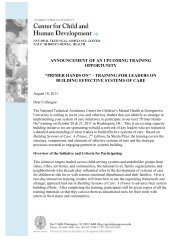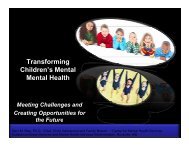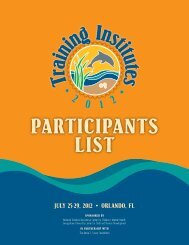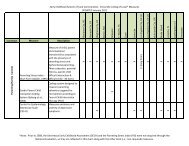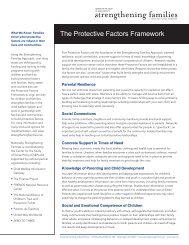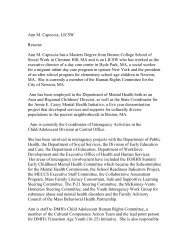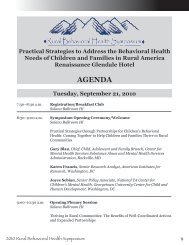Training Institutes 2012 - National Technical Assistance Center for ...
Training Institutes 2012 - National Technical Assistance Center for ...
Training Institutes 2012 - National Technical Assistance Center for ...
You also want an ePaper? Increase the reach of your titles
YUMPU automatically turns print PDFs into web optimized ePapers that Google loves.
WORKSHOP #18 8:30 AM FRIDAY • 3:30 PM SATURDAY • TALLAHASSEE 1-2<br />
Preparing Youth and Young Adults Who Have Experienced Trauma to be Advocates<br />
<strong>for</strong> System Change<br />
OBJECTIVES—Participants will learn:<br />
1. To explain how trauma impacts youth and young adults doing advocacy work<br />
2. To describe what youth and young adults need to know in order to protect themselves while effectively advocating<br />
<strong>for</strong> system change<br />
3. How to implement trauma-in<strong>for</strong>med strategies to better engage, prepare, and support youth and young adults to<br />
protect against potential re-traumatization<br />
4. To discuss challenges and solutions from the experiences of a <strong>for</strong>mer foster care alumnus and an adult support<br />
person who engages youth and young adults who have experienced trauma to participate in advocacy work at the<br />
policy and system levels<br />
This Workshop will focus on the impact of trauma on youth advocacy ef<strong>for</strong>ts and will provide a model of practice that will<br />
provide strategies and practical considerations <strong>for</strong> safe and effective engagement and advocacy work. The strategies to<br />
be highlighted are based on the Trauma-In<strong>for</strong>med Method of Engagement (T.I.M.E.) model developed by the presenting<br />
faculty based on the experiences of foster care alumni who are advocates <strong>for</strong> system change in the areas of child<br />
welfare, juvenile justice, and mental health, and the adults that support them. The strategies are aimed at increasing the<br />
competency of advocates and adult support partners while decreasing the level of potential re-traumatizing situations.<br />
Specific topics to be covered include in-depth strategies and examples of the T.I.M.E. four core practice considerations:<br />
• Relationship—trust and rapport, trauma triggers, and safety plan<br />
• Preparation—standard trainings, targeted messaging, and practice<br />
• Support—logistical needs, individual strengths and needs identification, and situational considerations<br />
• Reflection—debrief, trauma triggers check-in, and personal and professional development<br />
The session will include an opportunity to engage in brief exercises and dialogue with other participants to increase peer<br />
learning opportunities. The faculty team <strong>for</strong> the session will offer the perspectives of a foster care alumnus advocate and<br />
a licensed clinical social worker who is also an adult support partner.<br />
MODERATOR/PRESENTER: Eric Lulow, Youth Involvement Associate, Youth Involvement, <strong>National</strong> Federation of<br />
Families <strong>for</strong> Children’s Mental Health, Rockville, MD<br />
Debra Cady, M.S.W., L.C.S.W., Director of Child Welfare Policy, <strong>National</strong> <strong>Technical</strong> <strong>Assistance</strong> <strong>Center</strong> <strong>for</strong> Children’s<br />
Mental Health, Georgetown University <strong>Center</strong> <strong>for</strong> Child and Human Development, Washington, DC<br />
WORKSHOP #19 8:30 AM FRIDAY • 3:30 PM SATURDAY • DESTIN 1-2<br />
Our World, Our Words: Youth Perspectives on Cultural and Sexual Identity<br />
OBJECTIVES—Participants will learn from youth themselves:<br />
1. Strategies to work with youth who are of mixed identities<br />
2. Approaches <strong>for</strong> talking with and treating youth with different sexual orientations<br />
3. Challenges and solutions <strong>for</strong> addressing the needs of youth with diverse ethnic/racial cultures<br />
4. Methods <strong>for</strong> maximizing success in working with diverse youth<br />
This Workshop will focus on learning from youth with diverse identities about what has worked <strong>for</strong> them in systems of<br />
care. The youth panel will describe their personal journeys as they sought to discover their cultural and sexual identities<br />
while dealing with mental health challenges along with way. They will describe critical life challenges and events and<br />
the people and supports that guided their path towards success. The youth will share strategies about what worked and<br />
what didn’t work from the systems they were involved with, and how systems of care helped them achieve the goals<br />
they set. They will also offer advice to parents/caregivers, professionals, and other youth and young adults about how to<br />
best provide support and guidance <strong>for</strong> youth who are seeking to discover their cultural and sexual identities.<br />
<strong>Training</strong> <strong>Institutes</strong> <strong>2012</strong><br />
WORKSHOPS<br />
79



